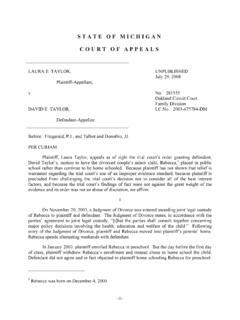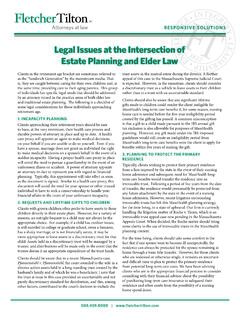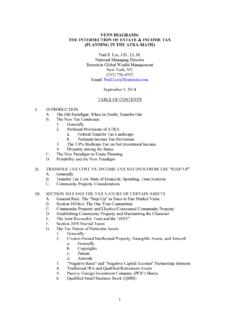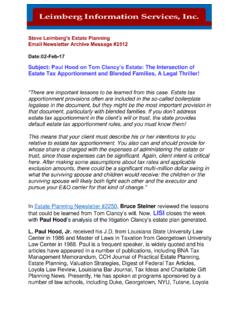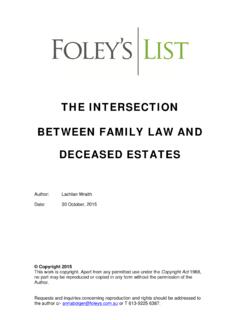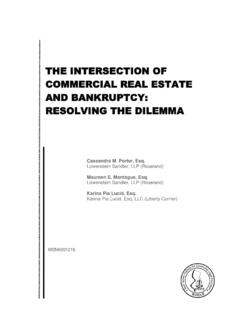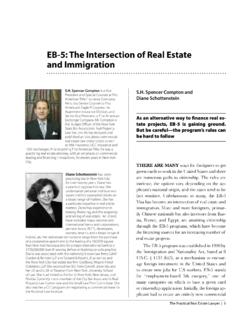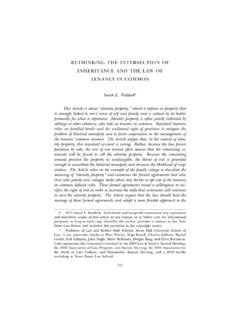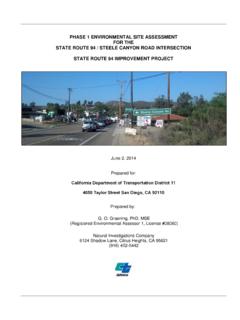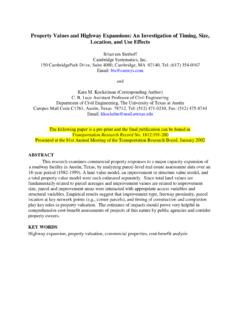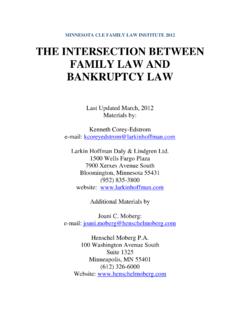Transcription of The Intersection of Estate Planning, Family Law, and Elder Law
1 Son and daughter-in-law predeceased Joe, but his remain-ing child is not in regular contact. Before their marriage, Joe and Sally executed a prenuptial agreement and individual Estate plans that provided for their own respective children and , unique Family dynamics affect the situation. One of Sally s children, Lynn, is in the midst of a contentious divorce involving minor children. Lynn and her soon-to-be-ex-husband are currently named as co-successor trustees on Sally s trust. Since Joe s son and daughter-in-law were killed in a car accident 10 years ago, Joe has been the guardian for his 15-year-old grandson, Michael.
2 Michael lives with Joe and and Sally were both retired when they married. Joe has a much higher fixed monthly income than Sally, but Sally has more in investments and savings. Their home is held jointly. Historically, the couple have contributed equally to living expenses, but Joe has developed fast-progressing dementia, requiring Sally to provide care and hire additional caregivers. At the onset of the marriage, all assets were held separately, but over time they have been commingled without regard to Joe s and Sally s respective Estate plans. Sally worries about her long-term financial security.
3 The following is a review of issues to consider when counseling this here are many commonalities between Elder law, es-tate planning, and Family law. All focus on the indi-vidual, and practitioners must balance legal advice with sensitivity and compassion, recognizing the life-altering events clients may be facing. Moreover, as late-in-life mar-riages become more common and spouses develop serious health issues, special considerations may be relevant to all these practice areas. Consider the studyJoe and Sally, in their mid-seventies, have been married for 15 years a second marriage for both.
4 They each had two children from their first marriages who had no contact with one another. Sally s children are close to the couple. Joe s The Intersection of Estate Planning, Family Law, and Elder Law16 Michigan Bar Journal January 201816 Elder Law and Disability RightsFAST FACTSD ivorce for those over age 50 is on the rise, and this growing demographic leads to unique planning options and pitfalls; therefore, it s important to understand the interplay between Family law and Elder law to help a Family navigate the process more aging couples who are in a second marriage, unanticipated healthcare expenses often create a strain between the spouse and children of a prior marriage as to how expenses will be paid and out of whose funds, and who will make the aging couples face overwhelming nursing home expenses, they sometimes believe their only option to qualify for Medicaid benefits is divorce.
5 However, in many circumstances, Medicaid planning techniques allow the couple to remain married and qualify for this situation, Joe s Family may have concerns with Sally being the decision maker and having unfettered access to Joe s funds. In addition, since Sally is Joe s medical patient advocate, she determines whether she will provide care for Joe in their home or place him in a facility. Sally s children may worry that Joe may not have enough resources to pay for his care and that their mother s financial security may be in jeopardy. Since both Joe and Sally are retired, they have no ability to replenish their estates as they face these overwhelming happens when a couple has been married for so many years that they no longer follow their prenuptial agree-ment?
6 By commingling assets, Joe and Sally have muddied the waters in terms of Estate planning objectives and created doubt as to their current intentions and the ongoing appro-priateness of the prenuptial Estate planningSometimes clients have done everything right and have written plans in place, but unforeseen circumstances of named beneficiaries may require changes. In the scenario above, Lynn s impending divorce should prompt Sally to strongly con-sider taking immediate steps to remove Lynn s husband from any decision-making possible scenario in which clients may want to re-vise their plans is when they are leaving money to a child who has special needs or is in a rocky relationship.
7 The inheritance Remarriage and prenuptial agreementsJoe and Sally s situation illustrates many common dilem-mas when marrying later in life. Problems such as unfore-seen and challenging Family dynamics are mixed with the competing priorities of preserving assets for children of pre-vious marriages while balancing the needs of a spouse and the costs of care. Joe and Sally were proactive, intentionally planning for the division of their assets upon their divorce or deaths. Even so, as suitable as their plans were at the incep-tion of their marriage, new considerations take priority when revising their planning needs and objectives.
8 Although their existing plans may no longer be a perfect fit, they are helpful because they reflect the couple s overall wishes and inten-tions. Absent this, Joe s dementia would make it virtually im-possible to determine his marrying later in life often have children from pre-vious relationships and have accumulated wealth that they want to protect for those children. However, as the couple ages, unanticipated healthcare expenses often create a strain between the spouse and children as to how expenses will be paid and out of whose funds, and who will make the deci-sions.
9 This is an especially challenging dynamic when remar-riage occurs later in life and the children never establish sig-nificant relationships with each other or the stepparent. In addition, determining who will care for the parent and make medical decisions can become Rosemary Howley Buhl and Katie Lynwood17 January 2018 Michigan Bar JournalMichigan Bar Journal January 2018 Elder Law and Disability Rights The Intersection of Estate Planning, Family Law, and Elder Law18divorced. A separation agreement or pre- (or post-) mari-tal agreements do not provide protection. Also, Medicaid does not allow for alimony by a Medicaid recipient in a nurs-ing some circumstances, one spouse may have dementia or other medical conditions that result in capacity issues.
10 In that case, it may be necessary to have a guardian or conservator appointed on behalf of the incapacitated spouse to ensure adequate protection for both parties. Given Joe s diagnosis, if either spouse were to pursue a divorce, it may be necessary to have a guardian and conservator appointed on his interplay of Family law, Estate planning, and Elder law needs to be handled not only with an understanding of the technical side of the law, but also with a sensitivity to the chal-lenges related to the aging process. Lack of physical ability, mental capacity, and ability to change financial circumstances make this type of representation unique.


